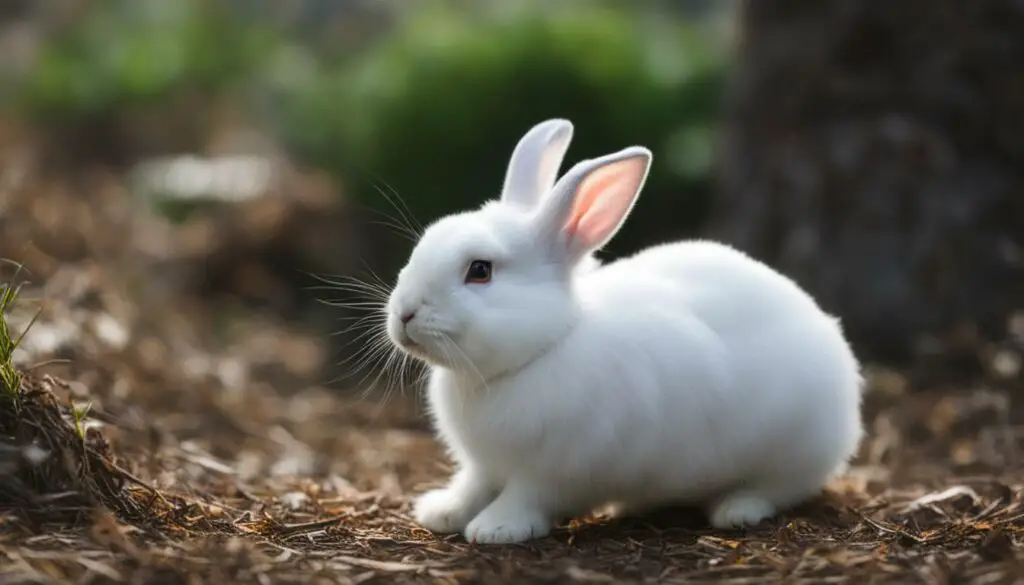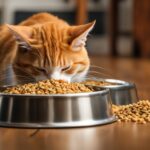As a rabbit owner, it’s important to be familiar with your furry friend’s behavior and health. One common occurrence that can cause concern is sneezing. However, if your rabbit is sneezing but acting normal otherwise, there’s usually no need to panic. Understanding the reasons behind their sneezing can help you determine if it’s a normal behavior or a sign of an underlying issue.
Key Takeaways:
- Occasional sneezing in rabbits is normal, but frequent sneezing may indicate an underlying health issue.
- Sneezing in rabbits can be caused by allergies, irritants, respiratory infections, or improper bedding.
- Watch out for additional symptoms like nasal discharge, watery eyes, loss of energy, and a lack of appetite.
- If your rabbit is exhibiting concerning symptoms, it’s advisable to seek veterinary attention.
- Home remedies can help alleviate sneezing, but proper diagnosis and treatment from a vet are essential for underlying health conditions.
Reasons Why Rabbits Sneeze
When it comes to understanding why rabbits sneeze, there can be multiple reasons behind this common behavior. Sneezing in rabbits can occur due to various factors, including environmental irritants, allergies, and respiratory infections.
Allergies: Just like humans, rabbits can also develop allergies to certain substances, such as pollen, dust, or mold. These allergens can irritate their nasal passages, leading to frequent sneezing. It’s important to identify and minimize exposure to potential allergens to help alleviate sneezing in rabbits.
Environmental Irritants: Dust, smoke, strong scents, and even certain types of bedding or litter can cause sneezing in rabbits. These irritants can trigger a reaction in their sensitive respiratory system, resulting in sneezing episodes. Ensuring a clean and well-ventilated environment for your rabbit can help reduce the occurrence of sneezing caused by environmental irritants.
Table: Common Causes of Rabbit Sneezing
| Cause | Description |
|---|---|
| Allergies | Rabbits can develop allergies to pollen, dust, or mold, which can trigger sneezing. |
| Environmental Irritants | Dust, smoke, strong scents, and certain types of bedding or litter can irritate the rabbit’s nasal passages, causing sneezing. |
| Respiratory Infections | Bacterial or viral infections can lead to respiratory issues in rabbits, including sneezing. |
Respiratory Infections: Sneezing can also be a symptom of respiratory infections in rabbits. Bacterial or viral infections, such as Snuffles (caused by Pasteurella multocida), can cause sneezing along with other symptoms like nasal discharge, watery eyes, or difficulty breathing. If your rabbit is sneezing frequently and displaying other signs of illness, it’s important to consult a veterinarian for a proper diagnosis and treatment plan.
Overall, understanding the reasons behind rabbit sneezing can help you identify whether it’s a normal occurrence or a sign of an underlying health issue. Monitoring your rabbit’s overall behavior and seeking veterinary attention when necessary can ensure their well-being and help address any health concerns they may have.

When to Be Concerned About Rabbit Sneezes
If you notice your rabbit sneezing frequently but still acting normal otherwise, it’s important to pay attention and assess the situation. While occasional sneezing is usually harmless, there are certain signs that may indicate a more serious underlying issue.
Here are some signs to watch out for when it comes to rabbit sneezes:
- Frequent sneezing accompanied by nasal discharge
- Snoring sounds while breathing
- Watery or irritated eyes
- Lack of energy or lethargy
- Loss of appetite
If your rabbit exhibits any of these symptoms, it could be a sign of a respiratory infection or other health problem. Sneezing can sometimes be a result of an upper respiratory infection, especially if it is accompanied by other concerning symptoms. In such cases, it’s advisable to seek veterinary attention for a proper diagnosis and treatment.
“Frequent sneezing accompanied by other symptoms may indicate a respiratory infection or health problem.”
It’s always better to be safe than sorry when it comes to your rabbit’s health. If you have any concerns about your rabbit’s sneezing or overall well-being, consulting a veterinarian is the best course of action. They can provide the necessary guidance and advice to ensure the health and happiness of your furry friend.
When to Be Concerned About Rabbit Sneezes
Sneezing and Upper Respiratory Infections
When it comes to rabbit sneezing, it’s important to understand that frequent sneezing can sometimes be a symptom of upper respiratory infections. One common infection is called Snuffles, which is caused by the bacterium Pasteurella multocida. Sneezing accompanied by other symptoms such as discharge, snoring sounds, or difficulty breathing may indicate an upper respiratory infection in rabbits. If you suspect your rabbit has an infection, it’s crucial to have them examined by a veterinarian for proper diagnosis and treatment.

“Snuffles is a highly contagious infection, so it’s important to isolate any infected rabbits to prevent the spread of the disease.”
In addition to Snuffles, there are other respiratory infections that can cause sneezing in rabbits. These infections can lead to serious health complications if left untreated. Therefore, if your rabbit is sneezing frequently but otherwise appears healthy, it’s still essential to consult a vet to rule out any potential upper respiratory infections. Early detection and treatment are key to ensuring your rabbit’s well-being.
Preventing Upper Respiratory Infections in Rabbits
Prevention is always better than cure, and there are measures you can take to reduce the risk of upper respiratory infections in rabbits. Maintaining a clean and hygienic living environment is crucial, as bacteria can thrive in dirty cages or unsanitary conditions. It’s also important to provide proper ventilation and avoid exposing your rabbit to damp or drafty environments. Regular check-ups with a veterinarian, proper nutrition, and vaccinations can also help prevent infections.
| Symptoms of Upper Respiratory Infections in Rabbits | Suggested Actions |
|---|---|
| Frequent sneezing accompanied by discharge, snoring sounds, or difficulty breathing | Consult a veterinarian for proper diagnosis and treatment |
| Watery or sore eyes | Isolate the rabbit and seek veterinary care |
| Lack of appetite, lethargy, or weight loss | Monitor closely and consult a vet if symptoms persist |
Other Symptoms to Watch Out For
While sneezing is a common symptom in rabbits, it’s important to watch out for other signs that may indicate a health problem. These symptoms, when present alongside sneezing, should not be ignored and may require veterinary attention:
- Head tilt or balance problems: If you notice that your rabbit is tilting its head to one side or having difficulty maintaining balance, it could be a sign of an inner ear infection or neurological issue.
- Drooling: Excessive drooling can indicate dental problems or an obstruction in the rabbit’s oral cavity. It’s important to have their teeth checked regularly for any abnormalities.
- Matted fur on the inside of the paws: Rabbits groom themselves regularly, but excessive grooming or matted fur on the inside of the paws may be a sign of discomfort or pain. It could be due to dental issues, skin irritation, or even arthritis.
- Lack of appetite: If your rabbit is sneezing and showing a decreased appetite, it may be a sign of an underlying health issue. Loss of appetite can be a symptom of gastrointestinal problems, dental issues, or other ailments.
These symptoms, combined with sneezing, may indicate an underlying health problem that requires veterinary care. It’s important to monitor your rabbit closely and consult with a veterinarian if you notice any of these signs.
“Head tilt or balance problems, drooling, matted fur on the inside of the paws, and a lack of appetite. If your rabbit is exhibiting these symptoms along with sneezing, it’s important to seek veterinary care.”
Remember, while sneezing can be normal for rabbits, it’s crucial to be aware of any changes in their behavior and overall health. Regular veterinary check-ups and prompt attention to symptoms can help ensure your rabbit’s well-being.
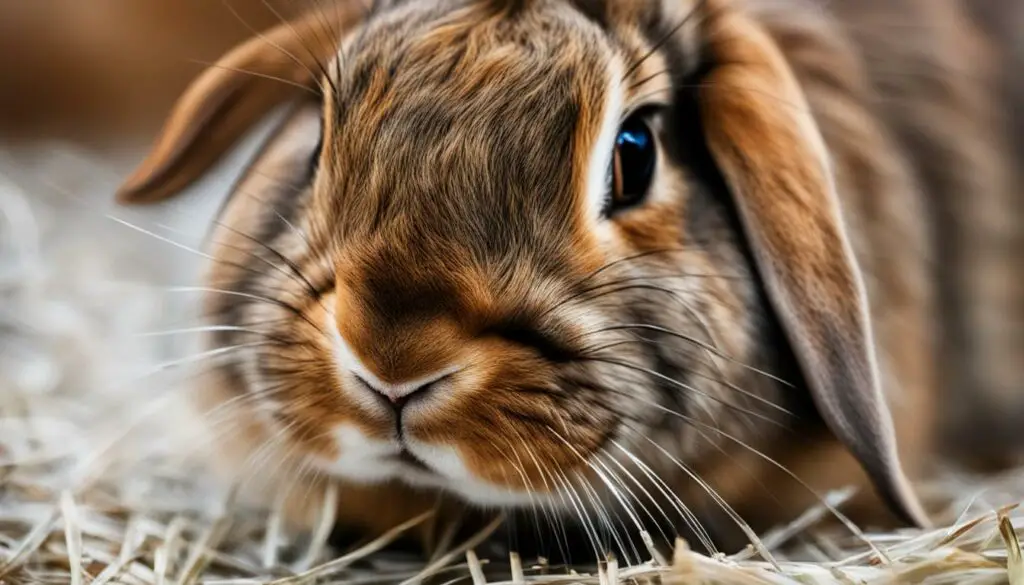
Should You Take Your Rabbit to the Vet?
When it comes to deciding whether or not to take your rabbit to the vet for sneezing, it’s important to consider a few factors. While occasional sneezes may not require immediate veterinary attention, there are certain situations when it’s advisable to seek professional advice.
If your rabbit is sneezing frequently and the sneezing is accompanied by other concerning symptoms, such as nasal discharge, watery eyes, lack of energy, or a loss of appetite, it’s recommended to take your rabbit to the vet. These symptoms may indicate a respiratory infection or another underlying health issue that requires medical treatment.
Additionally, if your rabbit’s sneezing persists for more than a few days or if you notice any changes in their behavior or overall well-being, it’s always best to err on the side of caution and consult with a veterinarian. Smaller animals like rabbits can deteriorate quickly, so it’s important to address any potential health concerns promptly.
What the Veterinarian Can Do
A vet will be able to properly examine your rabbit and determine the cause of the sneezing. They may ask you questions about your rabbit’s environment, including their bedding, diet, and exposure to potential irritants. They may also perform diagnostic tests, such as a physical examination, blood work, or X-rays, to rule out any underlying health conditions.
Once a diagnosis is made, the veterinarian will provide appropriate treatment options. This may include medications to alleviate symptoms, such as antibiotics for a respiratory infection, or recommendations for changes in the rabbit’s environment to reduce allergens or irritants. The vet can also offer guidance on preventive measures to keep your rabbit healthy and minimize the occurrence of sneezing in the future.
| When to Take Your Rabbit to the Vet: |
|---|
| 1. Frequent sneezing accompanied by other concerning symptoms. |
| 2. Sneezing persists for more than a few days. |
| 3. Changes in behavior or overall well-being. |
| 4. Concerns about your rabbit’s health. |
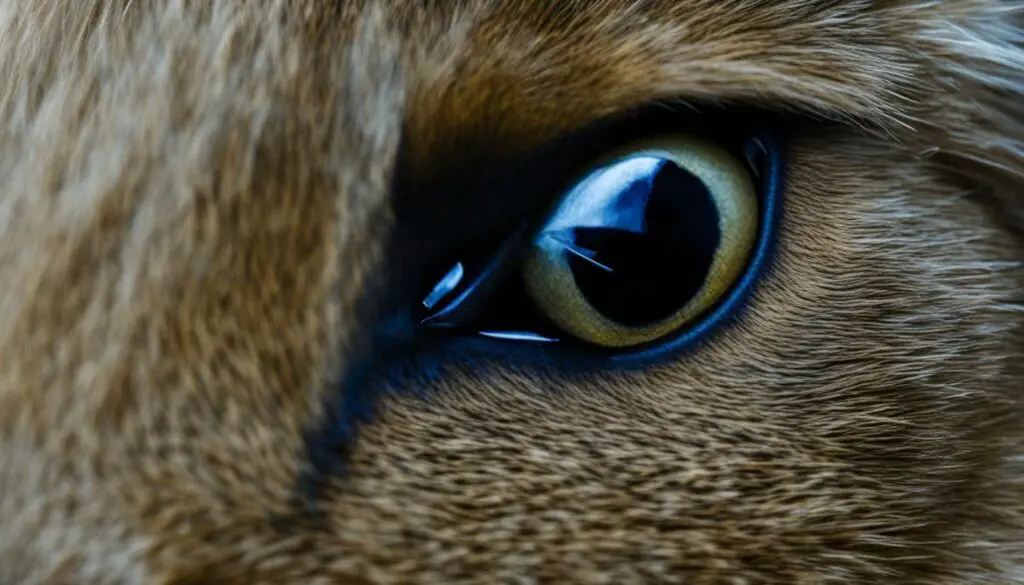
In conclusion, while occasional sneezing in rabbits may not require a vet visit, if your rabbit is sneezing frequently or exhibiting other concerning symptoms, it’s advisable to seek professional advice. A vet can properly diagnose any underlying health issues and provide appropriate treatment to ensure the well-being of your furry friend.
Home Remedies and Prevention
If your rabbit is sneezing but otherwise acting normal, there are some home remedies you can try to alleviate the issue and improve their overall respiratory health.
Keeping Your Rabbit’s Environment Clean
Regularly cleaning your rabbit’s living area is essential to prevent the buildup of dust, allergens, and other irritants. Use a pet-safe disinfectant to clean their cage or hutch, and ensure that bedding, litter, and hay are fresh and free from mold or mildew.
Removing Potential Irritants
Avoid exposing your rabbit to strong scents, smoke, or other airborne irritants that can trigger sneezing and respiratory discomfort. Keep their living space well-ventilated and avoid using harsh chemicals or strong-scented cleaning products near them.
Providing Warmth and Comfort
Rabbits are sensitive to temperature changes, and being too cold can weaken their immune system and make them more susceptible to respiratory issues. Provide them with a warm, draft-free environment and ensure they have access to cozy bedding and blankets.
While these home remedies may help alleviate sneezing in rabbits, it’s important to note that they may not be effective for underlying health conditions. If your rabbit’s sneezing persists or is accompanied by other concerning symptoms, it’s best to consult a veterinarian for proper diagnosis and treatment.

Rabbit Snuffles
Sneezing in rabbits can sometimes be a symptom of a serious bacterial infection known as snuffles. This condition is caused by the bacteria Pasteurella multocida and can result in a range of symptoms that affect the respiratory system of rabbits. If left untreated, snuffles can lead to more severe health issues and even be life-threatening for your pet.
Common symptoms of snuffles in rabbits include sneezing, coughing, snoring sounds, watery or sore eyes, and discharge around the nose. These symptoms may vary in severity depending on the stage of the infection. Snuffles can be highly contagious and easily spread from rabbit to rabbit, so prompt veterinary attention is crucial to prevent the infection from spreading throughout your rabbitry or household.
Diagnosing and treating snuffles requires the expertise of a veterinarian. The vet will conduct a thorough examination of your rabbit, which may include testing for the presence of the bacteria causing the infection. Treatment typically involves a course of antibiotics prescribed by the vet to combat the bacterial infection. It’s important to follow the vet’s instructions closely and complete the full course of treatment to ensure effective recovery.
| Symptoms of Snuffles | Treatment | Prevention |
|---|---|---|
|
|
|
Preventing the spread of snuffles involves isolating infected rabbits from healthy ones and practicing good hygiene. Regularly cleaning and disinfecting living areas can help minimize the presence of bacteria. Additionally, it’s important to minimize stress in rabbits, as stress can weaken their immune system and make them more susceptible to infections like snuffles. Providing proper nutrition and care, along with regular veterinary check-ups, can also help prevent the onset of snuffles in rabbits.

Allergies and Hypersensitivities
When it comes to rabbits, allergies and hypersensitivities can occasionally cause sneezing. However, it’s important to note that these conditions are relatively rare in rabbits. In most cases, sneezing in rabbits is more likely to be caused by infections or irritants in their nasal cavities or sinuses. One common culprit is dusty or moldy hay, which can trigger sneezing fits in sensitive rabbits.
If you suspect that your rabbit may be suffering from allergies, it’s crucial to take steps to evaluate and address any potential triggers. This could involve removing the source of the allergen, such as switching to a different type of hay or bedding. Keeping your rabbit’s living space clean and free from dust and other irritants can also help alleviate sneezing and other respiratory symptoms.
While home remedies can be effective in some cases, it’s important to remember that they may not fully address underlying health conditions. If your rabbit’s sneezing persists or is accompanied by other concerning symptoms, it’s best to consult a veterinarian for a thorough evaluation. They can provide appropriate guidance and treatment to ensure your rabbit’s well-being.
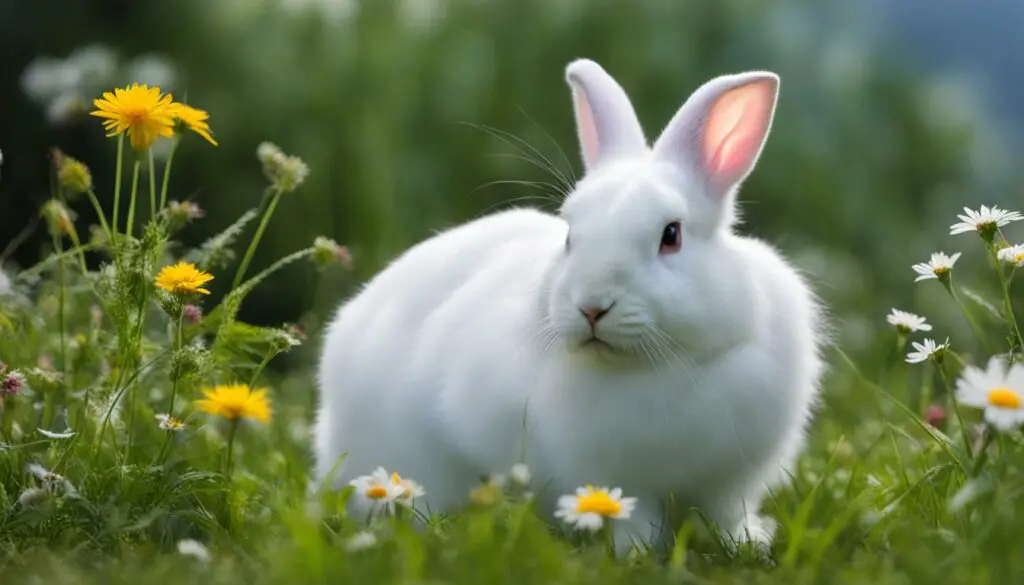
Effect of Smoking and E-Cigarettes
As a rabbit owner, it’s essential to be mindful of the effects of smoking and e-cigarettes on your furry friend. Rabbits are highly sensitive creatures, and exposure to the by-products of smoking or vaping can be harmful to their health.
When you smoke or vape around rabbits, they inhale the toxins present in the air, irritating their upper respiratory tract. Rabbits may also ingest these toxins while grooming themselves, further exacerbating the risk of respiratory issues.
To protect your rabbit’s health, it’s crucial to avoid smoking or vaping in their presence. Passive smoking can make rabbits more susceptible to respiratory infections and other health problems. Additionally, the chemicals present in e-cigarettes can be just as harmful to rabbits as traditional smoking.
The Dangers of Secondhand Smoke
Secondhand smoke can have severe consequences for rabbits. The toxins and chemicals in smoke can irritate their sensitive respiratory systems and lead to respiratory infections, allergies, or even lung cancer. It’s important to create a smoke-free environment for your rabbit to ensure their well-being.
By eliminating smoking and vaping from your rabbit’s environment, you are taking an important step in safeguarding their health. If you or someone in your household smokes, consider doing so outdoors or in a well-ventilated area away from your rabbit. This will help reduce their exposure to secondhand smoke and minimize the risk of respiratory issues.
| Effect | Risk Level |
|---|---|
| Inhalation of toxins | High |
| Ingestion of chemicals | High |
| Respiratory infections | High |
| Allergies | High |
Remember, the well-being of your rabbit should always be a top priority. Providing a smoke-free environment is one of the best ways to ensure their respiratory health and overall happiness.

Personal Experience with Sneezing Rabbits
As a rabbit owner, I have had personal experience with sneezing rabbits and wanted to share some insights with fellow pet parents. One of my rabbits, named Coco, occasionally sneezes without any other noticeable symptoms. At first, I was worried that it might indicate a respiratory problem, but after consulting with a veterinarian, I learned that occasional sneezing can be normal for some rabbits.
During Coco’s routine check-up, the vet assured me that rabbits have sensitive nasal passages, and sneezing can be a natural way for them to clear irritants from their noses. As long as Coco was acting normal, eating well, and showing no other signs of illness, the occasional sneeze was nothing to be concerned about.
It’s important to note that every rabbit is unique, and what may be normal for one rabbit may not be for another. If your rabbit is sneezing frequently or has other symptoms alongside the sneezing, it’s always best to consult with a veterinarian to rule out any underlying health issues.
Preventive Measures and Monitoring
While occasional sneezing may not require immediate veterinary attention, it’s still essential to monitor your rabbit’s overall health and take preventive measures to ensure their well-being. Providing a clean and dust-free environment is key to minimizing potential irritants that could trigger sneezing.
Regularly clean your rabbit’s living area, including their bedding and litter, to reduce the presence of dust and allergens. Opt for high-quality bedding and avoid materials that could be irritating to their respiratory system. Additionally, keep your rabbit away from strong scents, smoke, or any other potential irritants that could aggravate their nasal passages.
By maintaining a clean and healthy environment, you can help prevent respiratory issues and minimize the frequency of sneezing in your rabbit. However, it’s important to remember that home remedies may not be effective for underlying health conditions, so always consult with a veterinarian if you have any concerns about your rabbit’s sneezing or overall health.

Conclusion: Understanding Rabbit Sneezing and When to Seek Veterinary Care
After exploring the various causes and symptoms of rabbit sneezing, it’s important to understand when it’s a cause for concern and when it’s simply a normal behavior. While occasional sneezes are usually harmless, frequent or persistent sneezing accompanied by other symptoms warrants veterinary attention. Sneezing can be a sign of respiratory infections, allergies, or irritants in your rabbit’s environment.
When assessing your rabbit’s sneezing, pay attention to other signs such as nasal discharge, snoring, watery eyes, lack of energy, or a loss of appetite. These symptoms may indicate a respiratory infection or other underlying health issues that require medical intervention. It’s always better to err on the side of caution and consult a veterinarian if you have any concerns about your rabbit’s health.
To help prevent sneezing and maintain your rabbit’s respiratory health, ensure their living space is clean and free from potential irritants such as dust, pollen, and smoke. Regularly cleaning their enclosure and providing proper bedding can also help minimize respiratory issues. However, it’s important to note that home remedies may not be effective for treating underlying health conditions.
In conclusion, while sneezing in rabbits can be a normal behavior, it’s crucial to monitor your rabbit’s overall health and seek veterinary care when necessary. Prompt medical attention can help identify any underlying health issues and ensure the well-being of your furry friend. Remember, a veterinarian is the best resource for diagnosing and treating any medical concerns your rabbit may have.
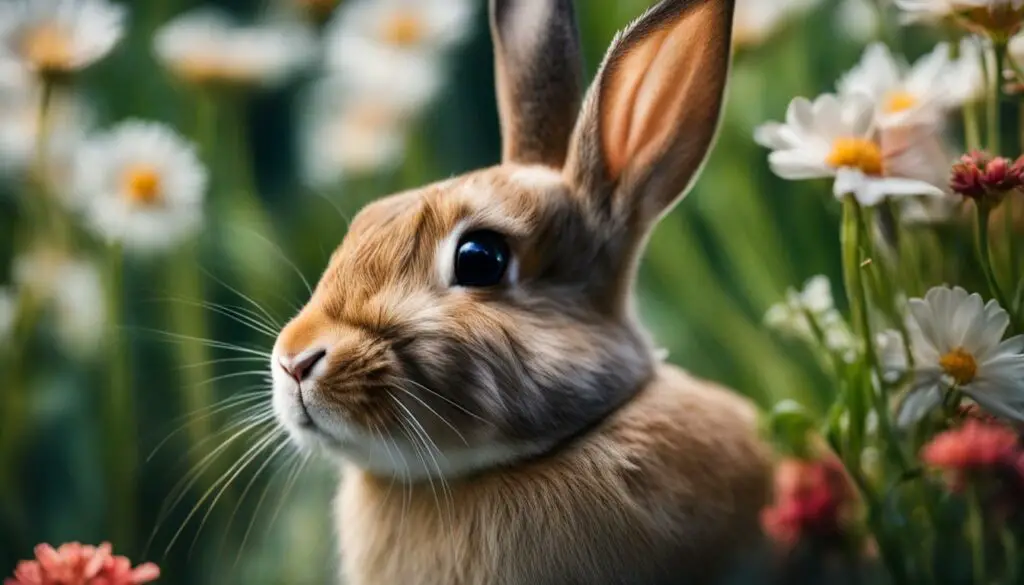
Additional Resources and Expert Advice
When it comes to your rabbit’s health and well-being, it’s always helpful to consult reputable resources and seek advice from experts. Whether you have concerns about your rabbit’s sneezing or other respiratory issues, these additional resources can provide valuable information and guidance.
One reliable source of information is the Healthy Rabbit website, where you can find a wealth of articles and resources on rabbit health, including common health issues and preventive care. They also have a section dedicated to respiratory conditions, which can help you better understand the causes, symptoms, and treatment options for sneezing in rabbits.
Another valuable resource is the Rabbit House, an online community where rabbit owners and enthusiasts share their experiences and knowledge. The forum section is a great place to connect with fellow rabbit owners who may have dealt with similar issues or can offer advice based on their personal experiences.
“The key to managing rabbit sneezing is to accurately identify the underlying cause and take appropriate measures. Consult with a veterinarian for a thorough examination and diagnosis.”
Remember, it’s important to consult with a veterinarian for personalized advice and guidance specific to your rabbit’s individual needs. They can provide a comprehensive evaluation of your rabbit’s health and offer professional recommendations for managing sneezing or other health concerns.
| Resource | Description |
|---|---|
| Healthy Rabbit | A comprehensive website with articles and resources on rabbit health, including information on respiratory conditions. |
| Rabbit House | An online community and forum where rabbit owners can share experiences and seek advice from fellow rabbit enthusiasts. |
Remember, every rabbit is unique, and the information provided in these resources should be used as a guide. If you have any concerns about your rabbit’s health or behavior, it’s always best to consult with a veterinarian for professional advice and guidance.
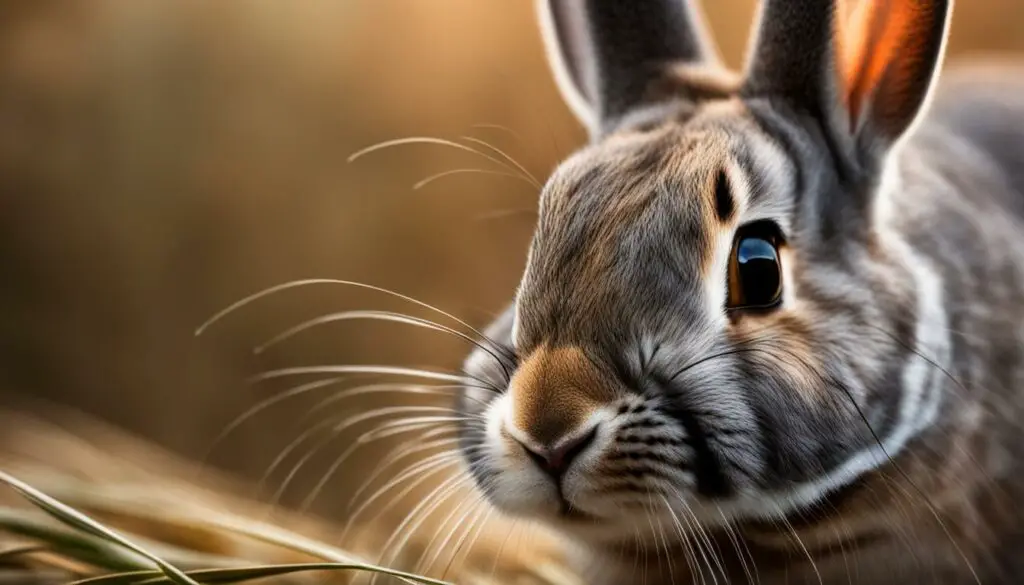
Conclusion: Understanding Your Rabbit’s Sneezing Behavior
After careful observation and research, I have come to the conclusion that sneezing in rabbits can be a normal behavior, especially if they are still acting normal otherwise. Occasional sneezing is typically harmless and can be a result of dust, pollen, or other irritants in their environment. However, it is crucial to pay attention to any changes in frequency or the presence of other symptoms.
If your rabbit is sneezing frequently or experiencing additional symptoms such as nasal discharge, snoring, watery eyes, lack of energy, or loss of appetite, it is advisable to seek veterinary attention. These could be signs of a respiratory infection or other underlying health issues that require medical treatment. Remember, it is always better to err on the side of caution when it comes to your furry friend’s well-being.
While home remedies like keeping a clean environment and removing potential irritants can help alleviate mild sneezing, they may not be effective for treating underlying health conditions. If you suspect an upper respiratory infection or allergies, it is essential to consult a veterinarian for an accurate diagnosis and appropriate treatment.
By being attentive to your rabbit’s overall health and seeking professional advice when needed, you can ensure that your beloved pet remains happy and healthy. Remember, your veterinarian and reputable resources are excellent sources of guidance and support when it comes to understanding your rabbit’s sneezing behavior and addressing any concerns that may arise. Their expertise will help you provide the best care for your furry companion.
FAQ
Can rabbits sneeze normally without any health issues?
Yes, occasional sneezing in rabbits is usually harmless and can be a normal behavior.
When should I be concerned about my rabbit’s sneezing?
If your rabbit is sneezing frequently or accompanied by other symptoms like nasal discharge, snoring, watery eyes, lack of energy, or a loss of appetite, it may indicate an underlying health issue and should be evaluated by a veterinarian.
What are the common causes of sneezing in rabbits?
Sneezing in rabbits can be caused by irritants like dust, pollen, smoke, or strong scents, as well as allergies, respiratory infections, and improper bedding or litter.
How can I tell if my rabbit has an upper respiratory infection?
Signs of an upper respiratory infection in rabbits include frequent sneezing, nasal discharge, snoring sounds, watery eyes, and difficulty breathing. If you suspect an infection, it’s important to consult a vet for proper diagnosis and treatment.
What are the other symptoms to watch out for in rabbits?
In addition to sneezing, other symptoms that may indicate a health problem in rabbits include head tilt or balance problems, drooling, matted fur on the inside of the paws, and a lack of appetite.
Should I take my rabbit to the vet for sneezing?
If your rabbit is sneezing frequently or exhibiting other concerning symptoms, it’s advisable to seek veterinary advice. A vet can properly diagnose any underlying health issues and provide appropriate treatment.
Are there any home remedies to help a sneezing rabbit?
Keeping the rabbit’s environment clean, removing potential irritants, disinfecting the rabbit area, and keeping your rabbit warm may help alleviate sneezing. However, it’s important to note that home remedies may not be effective for underlying health conditions.
What is snuffles in rabbits?
Snuffles is a common name for a bacterial infection in rabbits, often caused by Pasteurella multocida. It is a serious condition that requires urgent veterinary treatment and can be highly contagious.
Can rabbits have allergies?
While allergies can affect rabbits, causing respiratory symptoms like sneezing, they are relatively rare. It’s important to evaluate and address any potential allergy triggers in their environment.
How does smoking or vaping affect rabbits?
Rabbits are sensitive creatures, and exposure to the by-products of smoking or vaping can be harmful to them. It’s important to avoid smoking or vaping around rabbits to protect their health.
Can occasional sneezing in rabbits be considered normal based on personal experiences?
Personal experiences with rabbits that frequently sneeze without any other symptoms can provide reassurance that occasional sneezing may not be a cause for concern. However, it’s still important to monitor your rabbit’s overall health and seek veterinary advice if needed.
Where can I find additional resources and expert advice on rabbit health?
For more information on rabbit health and sneezing, it’s advisable to consult reputable resources and seek advice from rabbit health experts. They can provide further guidance and assistance in understanding your rabbit’s specific needs and addressing any concerns related to sneezing or respiratory issues.

